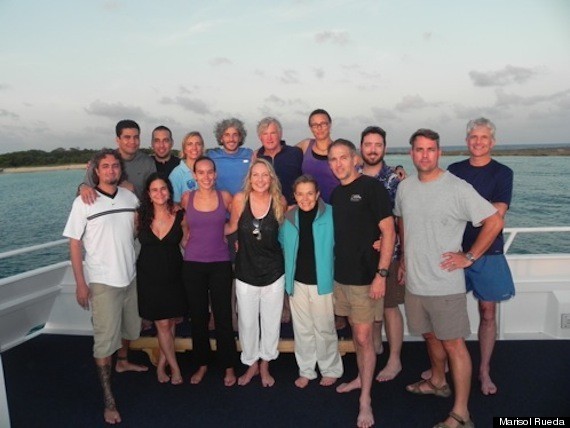Swan Islands Expedition Final Thoughts
By Dustin Boeger
The Mission Blue expedition to the Swan Islands and Mesoamerican Reef may have come to a close this week, but the message of Dr. Sylvia Earle -– and hard work –- still remains.
The expedition, led by Dr. Earle, world-renowned oceanographer, National Geographic Explorer-In-Residence and 2009 TED Prize Winner, aimed to accomplish two things -– raise awareness of the critical importance to the health of the ocean of the Swan Islands and Mesomaerican Reef, and catalyze public support for the protection of this “hope spot.”
True protection of hope spots, large areas that represent the lifeline of the ocean, the planet’s “blue heart,” means the creation of more marine protected areas (MPAs) -– places in the ocean where human activities like fishing are more strictly regulated than the surrounding waters. Think national parks for the sea…
Dr. Earle's idea of hope spots carries great importance in the realm of ocean conservation. It embodies her positive approach, looking at the potential and exposing the true condition of these special places.

The Mission Blue Expedition team gathers to say farewell to the Swan Islands after a week exploring this critical hope spot.
The expedition to the Swan Islands was a way to discover the true baseline status of these far-flung islands. The hope was that because of its distance from the Bay Islands and the Honduran mainland (150 miles from Roatan), this area would be an oasis of life, teeming with fish, and flush with the multitude of species present in a healthy reef.
The team’s last day on Roatan found them preparing for the farewell dinner and fundraiser for Roatan Marine Park. A delegation of local business people and VIP's joined the expedition team for dinner at the Tranquil Seas eco-resort, and a narrated presentation on the preliminary results of the Swan Islands research. Following the presentation, Dr. Earle addressed the group, giving her perspective on the expedition, her vision for the future, and a call to action for the attendees to save these special places and leave a legacy for future generations.
For those Huffington Post Green readers following the expedition since its inception, you now know that the reality of the Swan Islands is very different from the expedition team's initial visions.
The waters of the Swan Islands are not filled with the abundance of large fish and sharks that signal a healthy reef. Rather, these waters have suffered from significant overfishing, with expedition divers seeing only a couple of Caribbean reef sharks and only two large grouper.
This is cause for major concern.
But as Dr. Earle so eloquently explained to the team and their guests, there is cause for hope.
While only few large grouper were found, the team saw an incredible pair of goliath grouper, a critically endangered species in the Caribbean.
While the reefs around the island had clearly felt the impacts of multiple large hurricanes, the expedition surveys found sections of the reefs populated by endangered staghorn coral and elkhorn coral.
While the expedition divers surveying the reef did not see many Caribbean reef sharks, the shark team had significant success utilizing their baited underwater video surveys.
Moreover, they found sharks on 90% of their deployments, including a sighting of another critically endangered species – the great hammerhead shark.
Clearly, Dr. Earle, aka “Her Deepness,” is right in her reason for hope.

Dr. Sylvia Earle speaking to a local delegation at the Swan Islands Expedition farewell dinner in Roatan, Honduras.
But hope means nothing without action. The Swan Islands and Cordelia Bank need the full backing of the public, local governments and the media, to ensure that these gems of the Honduran waters -– and larger ocean system –- are protected.
Earle is calling for a team of “deep divers” to join her on her mission to save the oceans as if our lives depend on it -– because they do.
Using the unique hashtag #hopespots, Earle will continue to post daily, real-time content of her ongoing conservation efforts and expeditions, including photos, blogs, and video, on Twitter @bluerules and on her Facebook page Friends of Dr. Sylvia Earle.
Earle and her team are also encouraging the public to join them in taking action to protect other important hope spots by logging on to their website –- www.sylviaearlealliance.org -– where they can donate to local conservation efforts aimed at safeguarding the Mesoamerican Reef.

A Caribbean reef shark nick-named "Sylvia" provided in the expedition's last slideshow.